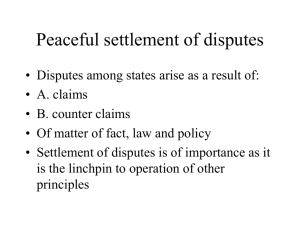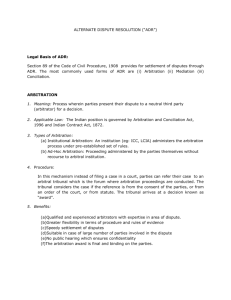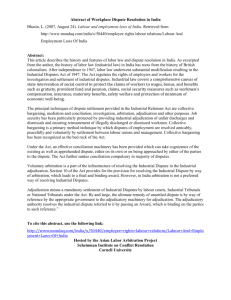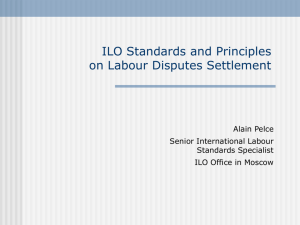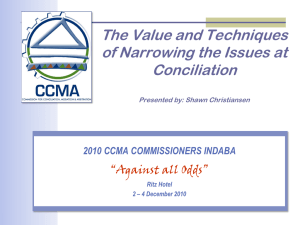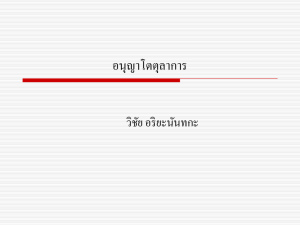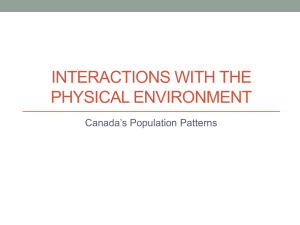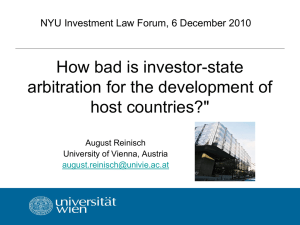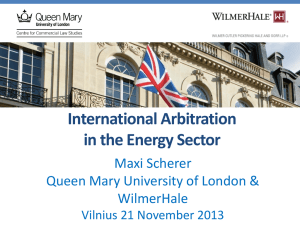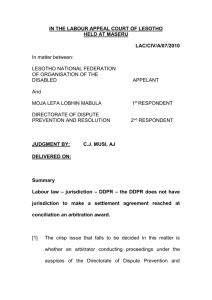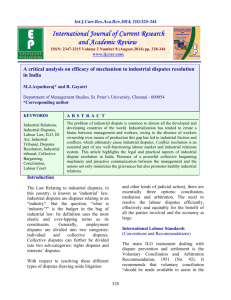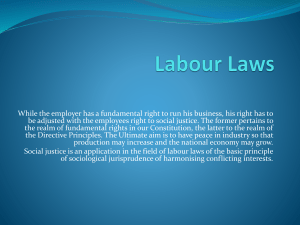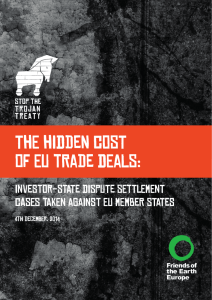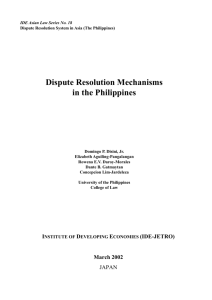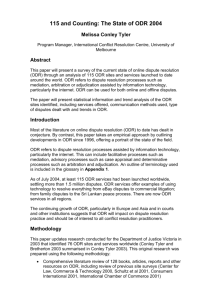International Settlement of Disputes (non-judicial)
advertisement
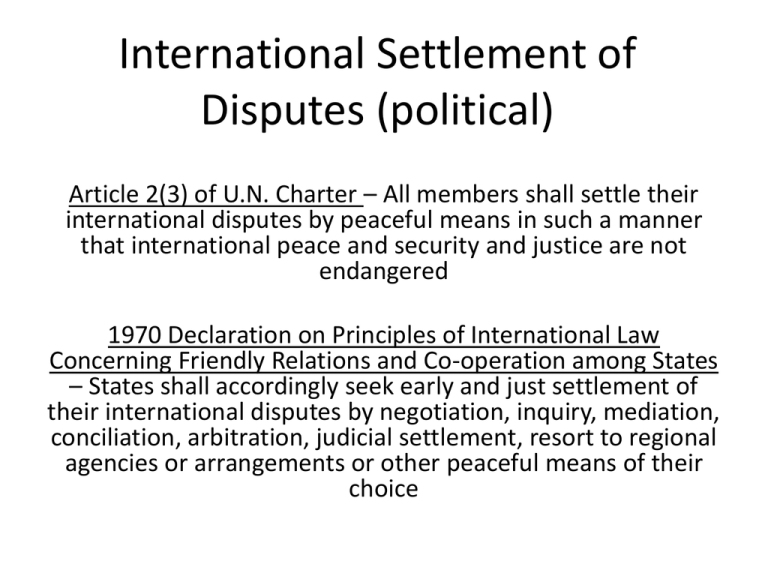
International Settlement of Disputes (political) Article 2(3) of U.N. Charter – All members shall settle their international disputes by peaceful means in such a manner that international peace and security and justice are not endangered 1970 Declaration on Principles of International Law Concerning Friendly Relations and Co-operation among States – States shall accordingly seek early and just settlement of their international disputes by negotiation, inquiry, mediation, conciliation, arbitration, judicial settlement, resort to regional agencies or arrangements or other peaceful means of their choice Diplomatic methods of settlement • Negotiation -> discussion between interested parties to reconcile divergent opinions – Direct engagement, doesn’t require a 3rd party – Simple and most utilized between friendly states – Usually a precursor to other settlement procedures • Good offices and mediation -> Involves 3rd party to promote a settlement – The 3rd party only acts as a mediator, but the solution comes from the parties themselves – Example: Egypt and Israeli over Sinai Peninsula Diplomatic methods of settlement • Inquiry -> Whereas there are differences of opinions regarding factual matters, the parties may request to institute a commission of inquiry by reputable observers to determine the facts in contention – Example: Dogger Bank incident of 1904 – Russia vs. U.K – Inquiry is also popular in the U.N. • Conciliation -> Involves a 3rd party investigation to the basis of the dispute and a report submitted with suggestions for a settlement – Combination of inquiry and mediation – Conciliation reports are merely proposals and are not binding -> different than arbitration – Example: Iceland-Norway dispute over continental Shelf delimitation between Iceland and Jan Mayen Island Settlement within the framework of the United Nations • U.N Charter based on terms of the Covenant of the League of Nations • Security Council of the U.N intended to function as the executive, with the General Assembly as the parliamentary forum – Both contribute to the peaceful settlement of disputes but only the Security Council could adopt binding decisions through Ch. VII • Role of Security Council: Maintain International peace and security – Its powers include the establishment of peacekeeping operations, the establishment of international sanctions, and the authorization of military action. Its powers are exercised through United Nations Security Council resolutions – There are 15 members of the Security Council. This includes five vetowielding permanent members—China, France, Russia, the United Kingdom, and the United States Security Council • Ch. VI – Pacific Settlement of Disputes - the Security Council "may investigate any dispute, or any situation which might lead to international friction or give rise to a dispute“ – Non-binding • Ch. VII - the Security Council has more power to decide what measures are to be taken in situations involving "threats to the peace, breaches of the peace, or acts of aggression". – includes the use of armed force. This was the legal basis for UN armed action in Korea in 1950 during the Korean War and the use of coalition forces in Iraq and Kuwait in 1991 and Libya in 2011. – Decisions in Ch. VII are binding upon UN Members General Assembly • May discuss any question or matter within the scope of the Charter, including the maintenance of international peace and security, and may make recommendations to the members of the U.N or the SC –> non-binding • “Uniting for Peace”, General Assembly Resolution 377 (1950) - where the Security Council, because of a lack of unanimity amongst its five permanent members, fails to act as required to maintain international peace and security, the General Assembly shall consider the matter immediately and may issue any recommendations it deems necessary in order to restore international peace and security. – With a 2/3rds vote in the General Assembly, they can override a Security Council Veto Secretary General of the U.N • Head of the U.N Secretariat, as well as de-facto spokesperson and leader of the U.N • The Secretary-General has the right to place any dispute on the provisional agenda of the Security Council – Palestine 2011 • Art. 99 of U.N. Charter – he is entitled to bring to the attention of the SC any matter which he thinks may threaten the maintenance of international peace and security • Secretaries-General have acted independently of the SC and GA as good offices role in situations. Also has acted upon the invitation of the parties themselves International Institutions and dispute settlement • Regional organizations: – The African Union (Organization of African Unity) • Art. 19 = principle of ‘the peaceful settlement of disputes by negotiation, mediation, conciliation, or arbitration.’ – The Organization of American States (OAS) • Art. 23 = international disputes between member states must be submitted to the Organization for peaceful settlement. – The Arab League • Facilities for peaceful settlement of disputes are not well developed, and informal conciliation attempts are often utilized. – The Council of Europe • Adopted the European Convention for the Peaceful Settlement of Disputes • Legal disputes are to be sent to the ICJ, while other disputes are to go to arbitration, unless the parties have agreed to accept conciliation • International Organizations – GATT, WTO, NAFTA, ECOWAS, World Bank Arbitration • Where diplomacy has failed, arbitration is arguably the most effective and equitable manner of dispute settlement • Unlike litigation, arbitration usually takes place out of court. • The two sides select an impartial third party, known as an arbitrator; agree in advance to comply with the arbitrator's award; and then participate in a hearing at which both sides can present evidence and testimony • Parties generally chose the arbitration method because of its flexibility, shortness, and because the parties have more control • Also the appropriate mechanism to utilize between states and international institutions, since only states may appear before the ICJ • Permanent Court of Arbitration (PCA) or special Tribunals such as the Iran-United States Claims Tribunal (IUSCT)
